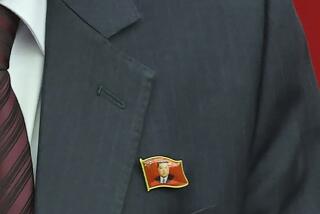North Korea honors seamen who tried to save Kim portraits
- Share via
Reporting from Seoul — Seamen who bravely go down with their ship can attain glory in any nation, but in North Korea, hero status also comes to seafarers who die while trying to preserve images of the Dear Leader.
On Friday, the autocratic state offered posthumous awards to crew members who drowned while reportedly attempting to save portraits of leader Kim Jong Il and his late father, Kim Il Sung, as a cargo ship sank in frigid water off the Chinese coast in November.
North Korean state news media announced that the captain and chief engineer of the Jisong 5 were proclaimed labor heroes for their valor. Their families were conferred gold medals and the Order of the National Flag First Class.
Five crewmen died and 15 were rescued by Chinese sailors when the vessel sank 90 miles out to sea in strong winds while heading toward the city of Dalian in northeastern China, according to reports.
The efforts of the entire crew were noted, news reports said.
The report by the Korean Central News Agency did not specify what the men had done to rescue the portraits or whether the art was saved before the ship sank.
“The crewmen displayed the spirit of defending the headquarters of the revolution, the heroic self-sacrificing spirit and the revolutionary comradeship in rough wind and waves,” news reports said.
Analysts say such awards drive home the sense of personal sacrifice called for by Kim’s cult of personality.
“North Korea trains its people in the religion of Kim Jong Il so that they are unconditionally loyal. As part of their policies, people are required to show blind, absolute loyalty,” said Cheong Seong-chang, a senior fellow at the Inter- Korean Relations Studies Program at the Sejong Institute near Seoul.
Portraits of Kim and his father, known as the nation’s “eternal president,” hang in most North Korean homes and public places.
“North Korea has always offered a commendation to citizens who saved portraits of Kim Il Sung and Kim Jong Il when their house was on fire,” Cheong said. “People know that even images of their leaders are more precious than their own lives.”
Ju-min Park of The Times’ Seoul Bureau contributed to this report
More to Read
Sign up for Essential California
The most important California stories and recommendations in your inbox every morning.
You may occasionally receive promotional content from the Los Angeles Times.














